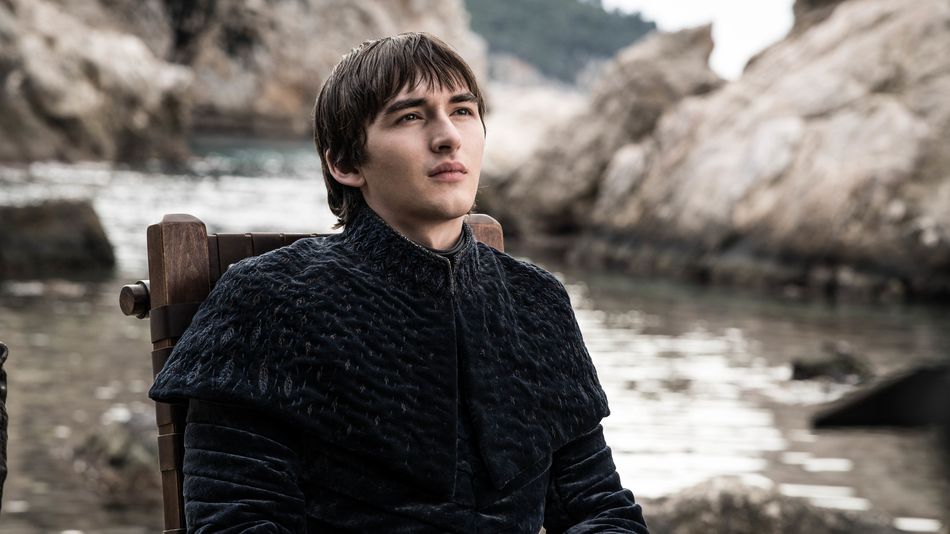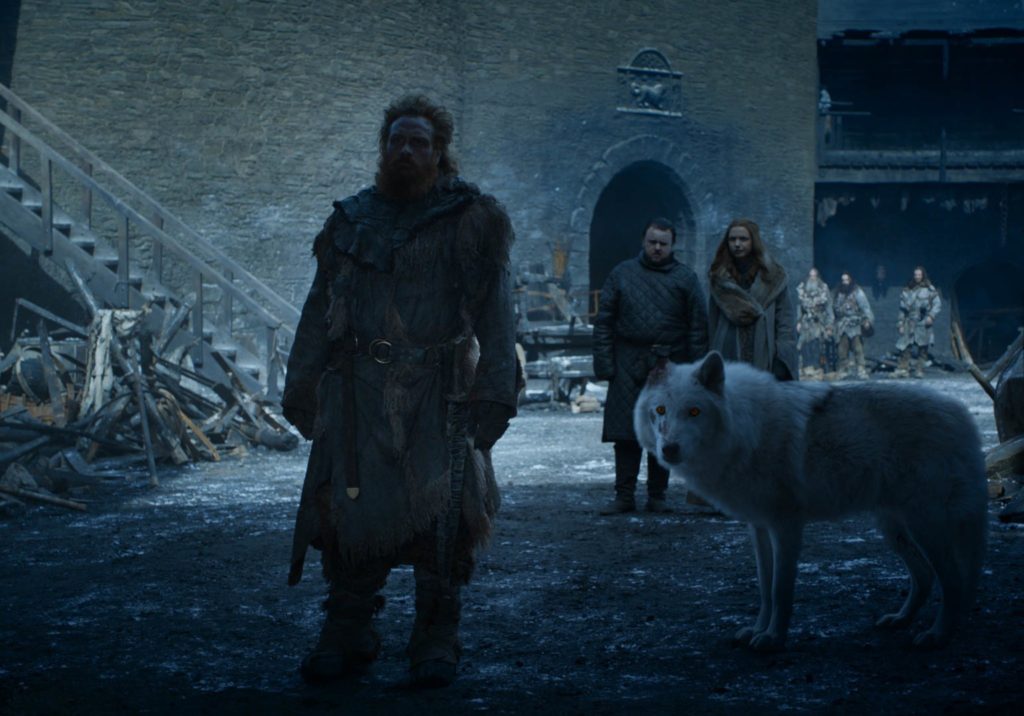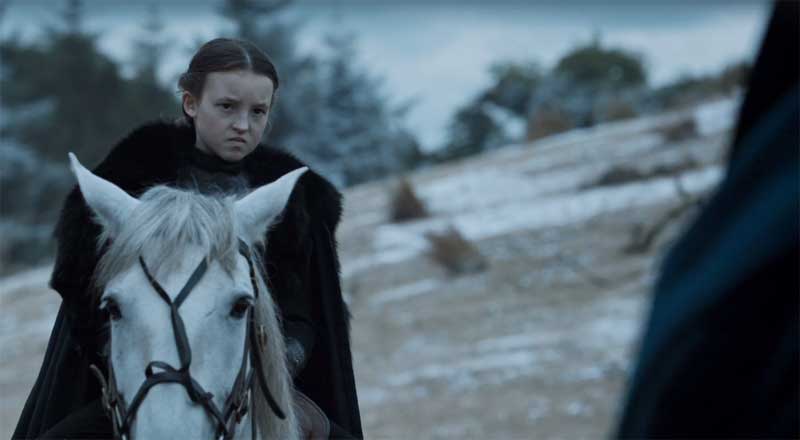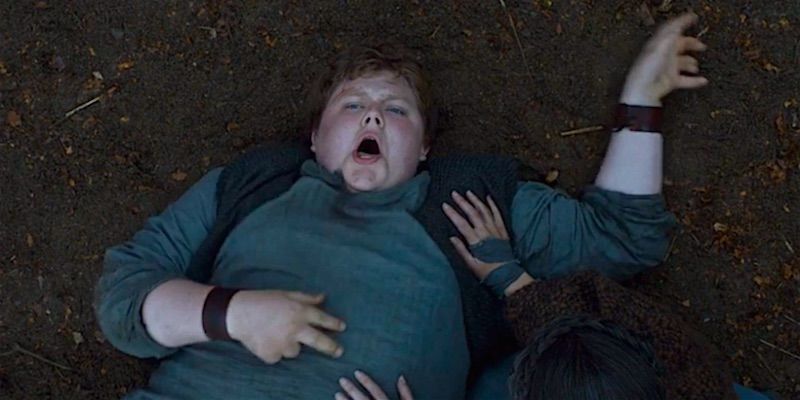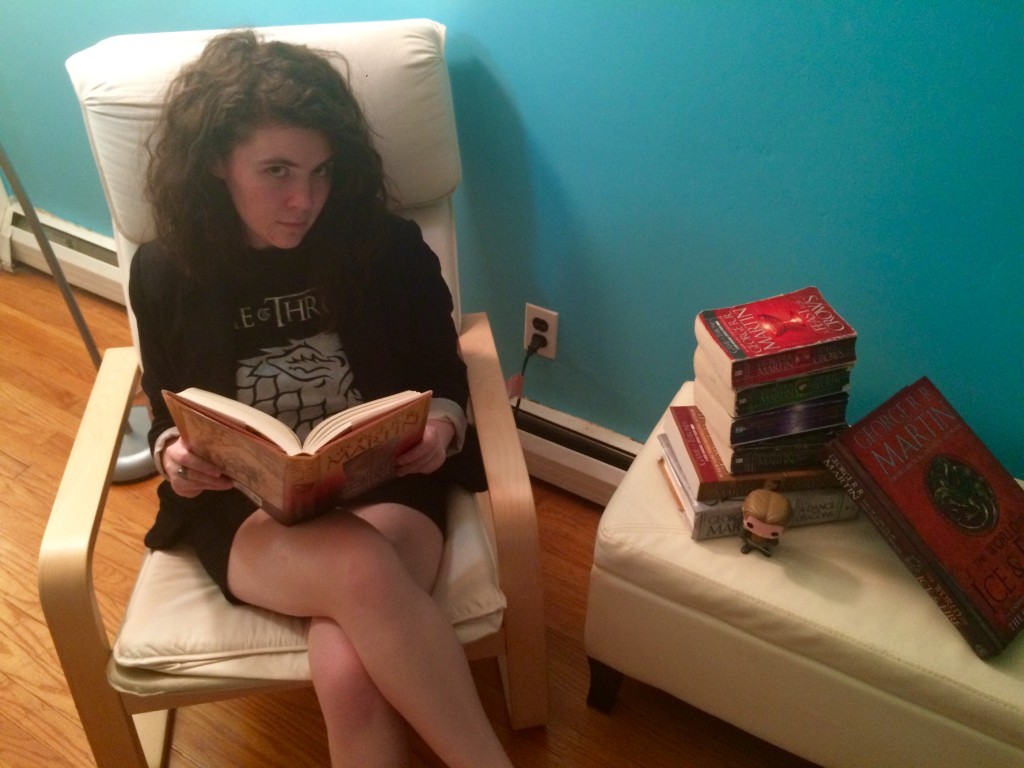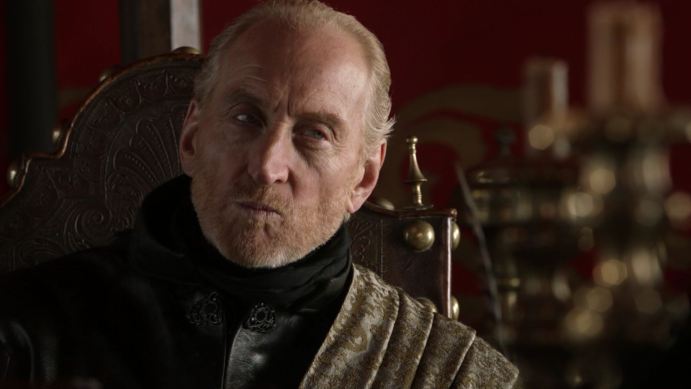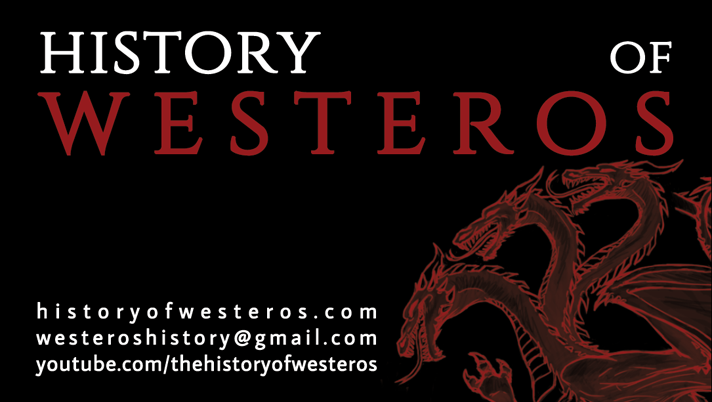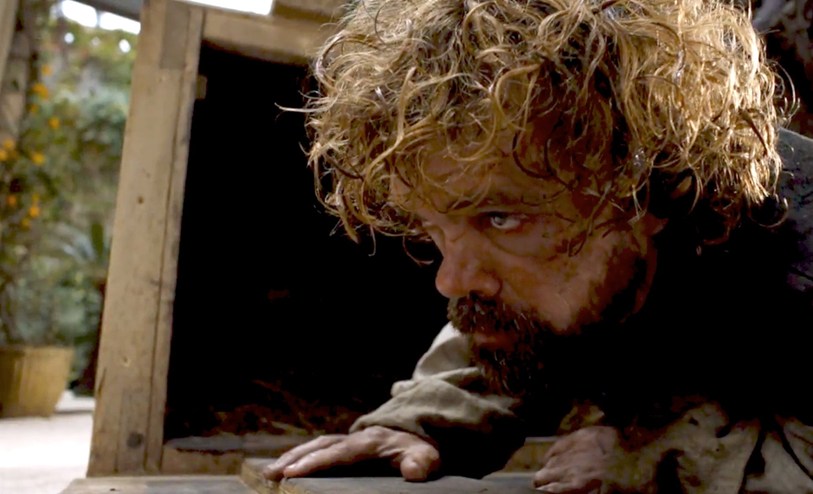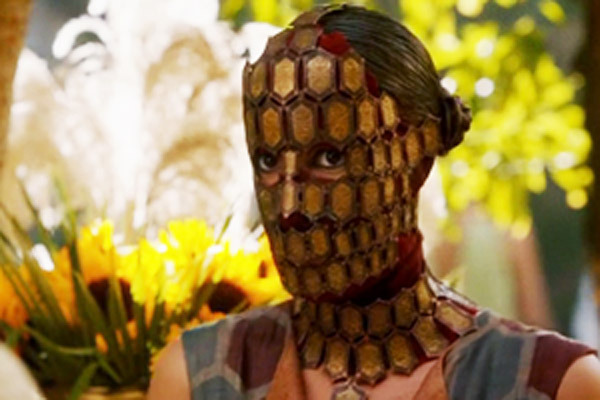With season six of Game of Thrones only a month away, Interviews of Ice and Fire is back to take a closer look at the vibrant A Song of Ice and Fire community. Today I’m honored to welcome Nina Friel.
One of your recent essays focused on House Peake, a house barely featured in the main series. Can you tell us a little about the research process that goes into such an obscure topic? Is it different from your work on more well-known Houses/topics?
It is different, but not as different as you might think. For that essay in particular, I really had to delve into The World of Ice and Fire; I noted each point in Westerosi history where the Peakes were notable actors, and I looked critically at whether the Peakes’ actions were in each case truly unjustifiable or merely ambitious. On the similar side, though, with many essays I like to consider topics that are sometimes thought of more one-dimensionally, and then expand on and complicate them. I did that for Viserys Targaryen, and Brandon Stark, and I wanted to do it for House Peake as well. My goal was to show the Peakes not as the easy villains they might always appear to be, but as simply another ambitious Westerosi house which has on occasion gambled poorly in the game of thrones.
So, for example, I looked at the driving of the Manderlys out of the Reach. As readers, we’re conditioned in a way to like the Manderlys – how often is Wyman’s “the North remembers” speech cited as a favorite quote? – so when we hear this fact, it might be natural to think of the Peakes as terrible villains for it. Yet the Manderlys also built White Harbor with money brought out of exile – a substantially expensive project. Could it really have been so black and white that the Manderlys were the poor “good guys” hastened into exiled by the Peake “bad guys” if the Manderlys had sufficient funds to build an entire city and castle in the style of the Reach’s “fine castles and towers”? That’s the sort of question I would pose to myself while writing this sort of essay.
As with any essay, I try to tease out as much meaning as possible from what little information is available. When writing about more obscure topics, there will of course be less information, so I do a fair bit of educated guesswork. Why was Lorimar Peake able to convince King Perceon III Gardener to exile the Manderlys? Well, it seems likely the Manderlys had done something to merit King Perceon’s distrust, because Yandel doesn’t note that any other houses of the Reach complained about the blatant royal tyranny in depriving a family of its holding for no crime. It’s a little bit of sailing into uncharted territory – I have only my own conclusions to go on – but that’s exactly what I like about writing about these less-talked-about: I feel especially with these essays that I’m really adding to the fandom.
You make the case that Varys took Tyrek Lannister in your “Heirs in the Shadows: The Young Lion” essay quite well. What do you think this means for Tyrion’s role in Varys’ plan?
Glad you liked that essay! I think for Varys, Tyrion provides another level of training for Aegon. He’s a seasoned Westerosi politician, from an eminently noble family, with no Westerosi allies and no reason to betray Aegon’s cause (because what is he going to do, go back to Westeros, where he’s a wanted man?). So long as Tyrion was with Aegon, he would be nicely mined for his political and dragonlore knowledge. Then, when Aegon returned to Westeros, Varys could stage a clever PR move, clasping the kinslaying, kingslaying, traitorous Tyrion in chains and parading him through the capital before executing him. Aegon has all the knowledge Tyrion imparted, and Tyrion himself could serve as a useful scapegoat for the new Targaryen regime. Varys is not a nice person, and has demonstrated that he is willing to kill even good, useful people (like Kevan Lannister) to further his aims.
Building off Varys’ scheme a bit, I wanted to ask a question about master plans in general. As an author, I’ve always been fascinated by the concept that GRRM came up with some of his characters’ motives back in 1996 that have yet to be fully revealed. Do you think that some of these characters have been following the same plan since AGOT?
It’s hard to say, right, how much George R.R. Martin envisioned when he started the series versus where he has it now. You look at something like the 1993 pitch letter, and it’s very bare bones – no Baratheon brothers, no other Great Houses, hardly anyone except Starks and Lannisters and Daenerys. Now, it’s Starks and Lannisters and Daenerys, and Tyrells and Martells and Greyjoys and Targaryen pretenders and R’hllor and Essos and everything else – it’s exploded as a narrative, which is wonderful of course as a reader.
So much has been added to the story, though, that I don’t know how characters can have stuck to exactly the plan the author had way back when the series started. Could Varys have been motivated, say, by a desire to sit a Blackfyre claimant on the Iron Throne way back in 1996, when the Blackfyres themselves wouldn’t be mentioned for four more years? No, probably not. But, might Varys have always wanted to seat a boy he claimed was the baby Prince Aegon on the Iron Throne? Possibly; we hear pretty early that the baby prince’s head was dashed against a wall, allowing for the possibility of a switched infant. So I think while very general character motivations have remained the same, I think as the novels have expanded greatly, details have been added to make these motivations more complex, more nuanced, more in keeping with the breadth of the novels themselves.
You did an article on “The Rogue Prince” back in January. The question of Archmaester Gyldayn’s credibility has been called into question several times over the years. Did the fool Mushroom’s testimony lead to any other questions regarding Gyldayn’s account?
“The Rogue Prince” and “The Princess and the Queen” were such a delight for me because I am a shameless historian (the same reason I adore The World of Ice and Fire). The narrative in the main series is wonderful, but reading these secondary source accounts of the court of Viserys I and the Dance of the Dragons warmed my historian heart. That format definitely made me consider the biases of the primary sources, as I would in any real work of history. Septon Eustace, for example, is an important eyewitness to court events, but he also anointed Aegon at his coronation, and as such carries some bias in his writing (like his probable invention of Aegon II nobly refusing the crown at first, before accepting it). Mushroom presents another view, but he himself thrived on exaggeration, reaching for the most scandalous and lurid tales to write an explicit, debauched chronicle. Gyldayn, as the historian, has to present these viewpoints, even when they conflict, leaving it for the reader to decide who had the right of it in different aspects of the history. Of course, Gyldayn himself is suspect in what he chose to include in his accounts, how he chose to frame issues – little enough is noted about Aegon’s extramarital affairs, while Rhaenyra’s having supposedly bastard sons consume a large chunk of “The Rogue Prince” – but that may be going too far down the rabbit hole.
What I think is fascinating about Gyldayn as well is that he was the last maester at Summerhall before it burned down, and may have well been there for the tragedy that took the lives of Aegon V, Prince Duncan, and Ser Duncan the Tall, among others. I don’t know how that fact affects “The Rogue Prince” and “The Princess and the Queen”, but I sense that there is a definite reason that Summerhall’s last maester wrote these two important histories that we have, and the section on the Conquest from The World of Ice and Fire.
Will we see a fifth Blackfyre rebellion, if that’s not what Aegon is up to at Storm’s End anyway?
I definitely think Aegon is a Blackfyre descendant through the female line, but I don’t think it will ever come up in the narrative beyond a few hints that he is, in fact, no true Targaryen. Aegon is claiming Westeros in the name of not the Black Dragon but the Red (even if he happens to be a black dragon made red with rust); the last Blackfyres barely made it to Westeros – hell, Maelys the Monstrous never made it past the Stepstones! – but there are still Targaryen sympathizers in the realm, and they may well rally to the supposed son of Rhaegar. Not that the boy himself knows – as far as he is aware, I think, he is truly Rhaegar’s son. But even if he calls himself a Targaryen, Illyrio and Varys get their Blackfyre pretender, the Golden Company gets to return home under a victorious dragon banner (and fulfills that “contract written in blood”), and Aegon gets a crown. Everyone wins. So, perhaps in some way a de facto Blackfyre Rebellion, but don’t expect anyone outside the fandom to call it that.
(Technically, though, the War of the Ninepenny Kings was the Fifth Blackfyre Rebellion, led by Maelys, the last of the male Blackfyre line. This war would be the Sixth, which in a funny coincidence would also be Aegon’s regnal number.)
The frustration regarding The Winds of Winter has been well documented across the fandom, but we haven’t seen much from the perspective of the commentators. As a historian, how does the “yet to be revealed” aspect of the series affect your research?
In a way, it’s sort of freeing; when you don’t know where the story will go, you can really let your creativity lead your analysis and speculation. So, for example, in my Heirs in the Shadows series that I stared recently, I’ve been able to offer a number of theories about possible inheritors of Westerosi seats. Will Tristan Rivers, for example, actually be the Bastard of Darry and become lord of that castle? Maybe, maybe not, but it’s fun to think that it could happen while making sense for the narrative.
On the other hand, of course, that open space can make my doing research – well, not exactly intimidating, but maybe a little uncertain. I have a feeling, whenever I write The Winds of Winter speculation, of “I could be totally off-base about this, and it will be proven in the not too distant future.” It makes me think about the wildly different conclusions members of the fandom came to – myself included – about Sansa’s “controversial” chapter in The Winds of Winter; when that chapter came out, I at least definitely didn’t think it was nearly as controversial as some of the theories would have had it.
But it’s still fun to speculate, whether I actually end up being right or not, and the wait for The Winds of Winter definitely brings out the creativity. I don’t mind the wait; of course I’d love The Winds of Winter right now, but if the wait means that we’ll get that much better of a book from GRRM, then I’ll wait to have the book.
Does the show play a part in your analysis?
No, it does not. I base everything I write off of the books, and I only speculate to the future narrative of the books. I know it has been said that the show and the books will end in roughly the same place, but how the show gets there is a mystery I am wholly unqualified to solve.
Some fans are refusing to watch the show until the books are finished. The question of how much will be spoiled is one that I’ve wondered for the past year. How much are you concerned about the spoilers?
I completely understand people who don’t want to watch the show because of spoilers; when you’ve invested so much time in the series (and some people have been reading these books for 20 years now), you might not want a TV show not even half that old telling you the ending. For me, though, the show is sort of its own universe: it certainly takes from the books’ narrative, but so much has changed story-wise for so many characters that even if the two narratives end up roughly in the same place, there will be so much left to surprise us in the books. Characters dead in the show remain alive in the books, characters who don’t exist in the show are very important in the books, and the limitations of television – the show has 10 hours every season, George R.R. Martin has as many pages as he’d like to write (that can fit in a hardcover binding, at least) – means that the books have the luxury of very expansive storytelling.
As an example: I don’t think the Aegon storyline will be explored in the show, but as Jeff has been writing about in his Blood of the Conqueror series, there’s so much that Aegon will do and looks likely to do in The Winds of Winter. His storyline is going to affect a number of characters, and Daenerys, for one, may very well struggle with facing him as a challenger to the throne she’s thought for years was hers. I think it will be fascinating to watch that struggle – to watch Daenerys balance him as a potential nephew and a false pretender – and that’s something show watchers will not be able to enjoy, no matter if Daenerys ends up in the same place in both storylines.
So, in a roundabout answer, no, I’m not concerned about spoilers. What happens in the show may or may not happen in the books exactly the same way, and that’s how it goes. I’m excited to read the narrative, I’m excited to see what George R.R. Martin really excels at – drawing extremely lifelike, relatable, fully dimensional characters – and whatever happens on the show happens on the show.
If you could have one TWOW spoiler right now, which would it be?
Just one? Damn. Hard, hard question. Well, if we’re talking specifically TWOW spoilers, but just one … I want to know, without any other information, who is on the Iron Throne at the very end of the book. Just the names of the king and queen or queen and king-consort (if there is a consort in either case). I have some thoughts, but whether I’m right or wrong, I would still be able to play around with how the pieces got there.
You joined Wars and Politics of Ice and Fire a little over a year ago. How has writing about the series changed your perspective?
It has been an absolutely fantastic experience writing for the blog. I was completely flattered when Jeff messaged me asking if I would write, because I had read the essays on the site and had always been impressed by the quality of their analysis. In that year, I have grown so much as a writer and generally as a fan of the series; I’ve been able to go deeper into the details than I ever thought I would, and create rational, narrative-based explanations for characters and stories. Writing for the blog has taught me not to judge characters and situations immediately, but to consider circumstances and actions very carefully: a man who seems devoted to his cause – like Wyman Manderly – can at the same time be ambitious for his house; a woman who seems good-hearted and altruistic – like Alysanne – can at the same time be politically active and subtly imposing.
Reception for season five was fairly lukewarm among the fandom when it first aired, though obviously did quite well at the Emmys. Has your opinion of it changed at all a year later?
No, I would say not. I was not shy about saying how I felt about the season when it aired last year, and I don’t believe that my opinions have changed in a year. In some aspects, the show did quite well – the Walk of Shame was particularly well executed, Jonathan Pryce did a very nice job as the High Sparrow, and Arya’s final scene had a nice show-only twist that I thought was very welcome – but in many aspects, I thought the quality simply did not match what had come before on the show. The writing in particular I thought suffered a severe downgrade from previous seasons, and again, I don’t think multiple viewings solve the problem for me.
Generic question, but one that I always like to ask. Who is your favorite character? Is the same true for the show?
Favorite character? Definitely Sansa. Sansa is a character that I really connected to at the beginning, and have grown in my love of as the series as progressed. George R.R. Martin excels as a writer when he takes what is so fundamental to a character and slowly, painfully, strips it away from him or her, and we see that so viscerally with Sansa. Chivalry and court life are exposed for the deadly game of power politics that they are, and Sansa is forced to endure physical abuse, public humiliation, and treatment as a political pawn. Yet she never breaks, never becomes cold or bitter (even though these would be perfectly natural, human reactions to what she’s endured); she survives, and adapts, demonstrating an admirable wisdom and courage as her story has continued.
As for the show – well, my favorite characters on the show are the characters that when I watch them, I go “Yes! That’s [Character Name]!” Charles Dance is now whom I imagine in my head when I read Tywin: he exuded Tywin’s firm power and Lannister pride in every scene. Jerome Flynn as Bronn has actually been far more entertaining for me than Book!Bronn, while still retaining that sellsword independence that so marks the book character. Of course, any scene with the Queen of Thorns is a delight; Diana Rigg embodies Lady Olenna perfectly, giving her the sharpness and wit she deserves.
It’s been close to five years since we had a full length ASOIAF book, with only sample chapters, novellas, and The World of Ice and Fire to tide fans over yet the community continues to be as ever. What do you think it is about ASOIAF that cultivates such a loyal fanbase?
One of my favorite attractions at Epcot in Disney World – don’t laugh – is Ellen’s Energy Adventure. “Ellen DeGeneres teaches you about energy” sounds sort of silly, and it is, but it’s charming in its way. Anyway. So she’s on Dream Jeopardy, and the Final Jeopardy answer is “This is the one source of energy that will never run out.” The correct response is “brain power”, which is a completely cheating answer that had nothing to do with the science-based categories before that, but again, it’s Disney World, you sort of knew that would happen going in.
Yet despite how cheating it was, that answer is sort of how I feel about the ASOIAF universe. The sheer amount of creativity George R.R. Martin has pumped into this universe, I think, inspires readers to creativity as well; the complexity of the novels challenges fans, to be sure, but in the best sort of way, forcing them to become careful readers, to connect seemingly obscure dots. That habit of careful, dedicated analysis, picked up through reading, transfers into the fanbase. Anytime you think you’ve read all there is to read about ASOIAF, go on Reddit, go on Tumblr, read some ASOIAF blogs, and I guarantee you you’ll find a theory or an analysis you’ve never seen before. Heck, it’s been nearly five years since A Dance with Dragons came out, but Tumblr friend Poor Quentyn just finished a truly amazing read through of Tyrion’s arc in that book, citing points and themes I never considered. ASOIAF endures and grows because its fanbase remains so motivated to find more, to fill the gaps, to continue to play in this highly detailed, highly expansive universe George R.R. Martin has built. ASOIAF kindles and encourages fan brain power, and that brain power will not run out in the foreseeable future.
I like to end these interviews with a question regarding one of the series’ larger theories. Since you already have me fascinated with Varys kidnapping Tyrek, I’d like to ask who you think ordered Mandon Moore to carry out the hit on Tyrion during the Battle of the Blackwater.
Oh, Littlefinger, 100% for me. Tyrion committed the ultimate crime in Littlefinger’s eyes: he made Littlefinger look dumb. Littlefinger is obsessed about being the smartest man in the room – and not just being the smartest, everyone has to know and acknowledge that he, Littlefinger, is so much more outrageously smart than all of them. The aristocratic system of Westeros did a number on Littlefinger in youth – how dare he think himself good enough to wed and/or bed a Tully! – so now he needs to outfox and pointedly humiliate his social betters, the people who personally wronged him. So when Tyrion tricked him – convincing him that Myrcella would be betrothed to Robert Arryn, and that he would get Harrenhal for arranging it – Littlefinger got pissed, and pissed, he sought revenge. (It also did not help Tyrion’s case that Littlefinger might have thought Tyrion knew he had helped kill Jon Arryn – Littlefinger was certainly caught off guard when Tyrion mentioned Arryn’s “true killer”, though ironically Tyrion himself did not suspect Baelish.)
I’d like to thank Nina for taking the time to answer my questions. You can find her on twitter by following @ninafriel.





